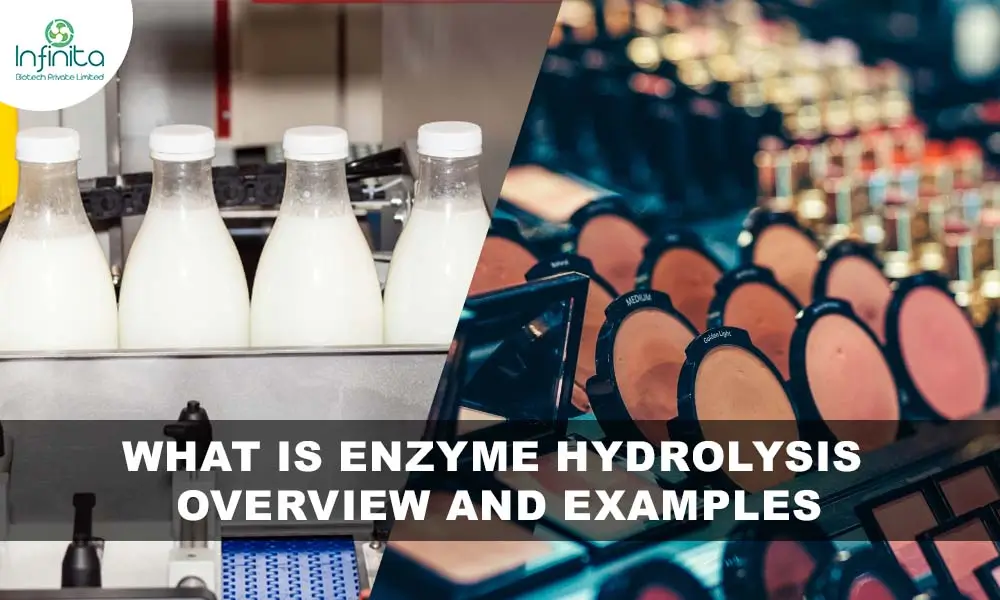Enzyme hydrolysis is the process of a compound’s catalytic decomposition by reaction with water in the presence of enzymes. Hydrolysis process is extensively used in the food industry for the transformation of cellulosic materials into fermentable materials by adding the enzymes. These enzymes work as catalysts and use water to split the bond. Over the years, this technique has evolved to a large extent, and nowadays, hydrolytic enzymes are widely used for the hydrolysis of lactose to produce Lactose free milk. Now, let’s understand why Enzyme hydrolysis is used in various industries and what its benefits are.
Benefits of Enzyme Hydrolysis
The enzyme hydrolysis food processing technique produces various sizes of peptides, enhancing dietary proteins’ functional properties. In recent years, numerous studies have been conducted on food proteins and reported that these proteins have specific bioactivities.. Moreover, enzyme hydrolysis lowers the toxicity and infectivity of milk proteins. Recently, this method has been extensively used to produce premium quality and hypoallergenic protein hydrolysates from various protein rich sources.
Use of Hydrolytic Enzymes In the Cosmetic Industry
The cosmetics industry is increasingly seeking naturalness and application of various enzymes is proliferating. It is a new area of study in dermatology and beauty products that seek to understand how enzymes can enhance skin appearance and protect against skin problems. The cosmetics industry is interested in enzymes that can improve skin beauty.
The use of enzymes and cofactors in beauty products may be a safe method for increasing the efficient functions of enzymes in the skin and thus help maintain the skin’s healthy appearance. These enzymes are relatively simple to incorporate into cosmetics, and most importantly, these products provide greater safety when topically applied.
Enzymes are used in the cosmetic industry for the purpose of resurfacing and skin smoothing. Moreover, skin therapists found these enzymes quite useful in resolving many skin conditions, such as pigmentation, scars, skin ageing, acne, congestion and much more. Hydrolytic enzymes have great cosmetic stability. They are able to seize free radicals to cure skin damage caused due to pollution, sun exposure, bacteria and other hazardous factors. Superoxide Dismutase enzyme with catalase effectively prevents ageing due to oxidation. It functions by dismutation, which is a method through which harmful and extremely reactive oxygen free radicals are transformed into non-reactive radicals.
Common Examples of Enzyme Hydrolysis
Due to their benefits and various properties, different hydrolytic enzymes are utilised in different industries. Some common hydrolytic enzymes and the industries where they are applied are mentioned below.
Lipase
Lipases are the enzymes of choice for potential applications in the industries like food, detergent, medicine, leather, fabric, beauty products, and paper industries due to their versatility. Lipases’ most crucial industrial applications have been in food, detergent, and pharmaceutical manufacturing.
Amylase
One of the most common enzymes found in a variety of industries. Amylase enzymes hydrolyse starch molecules to form polymers made up of glucose units. Amylases have the potential to be used in a wide range of industrial processes, including those in the food, fermentation, and pharmaceutical industries.
Protease
Proteases are extensively utilised in the baking industry to make bread, baked stuff, crackers, and waffles. These enzymes shorten the mixing time, reduce dough uniformity and consistency, regulate gluten strength in bread, and enhance texture and flavour.
Closing Words
The use of hydrolytic enzymes has increased in various industries over the years, and they offer multiple benefits in the manufacturing process. If you are involved in the manufacturing of food products, cosmetics, and bakery and need hydrolytic enzymes, Infinita Biotech can be the most reliable source for you. It is one of India’s leading biotechnology companies offering sustainable enzymatic solutions across the world for various industrial usages.

 Summarize this Article with AI
Summarize this Article with AI






